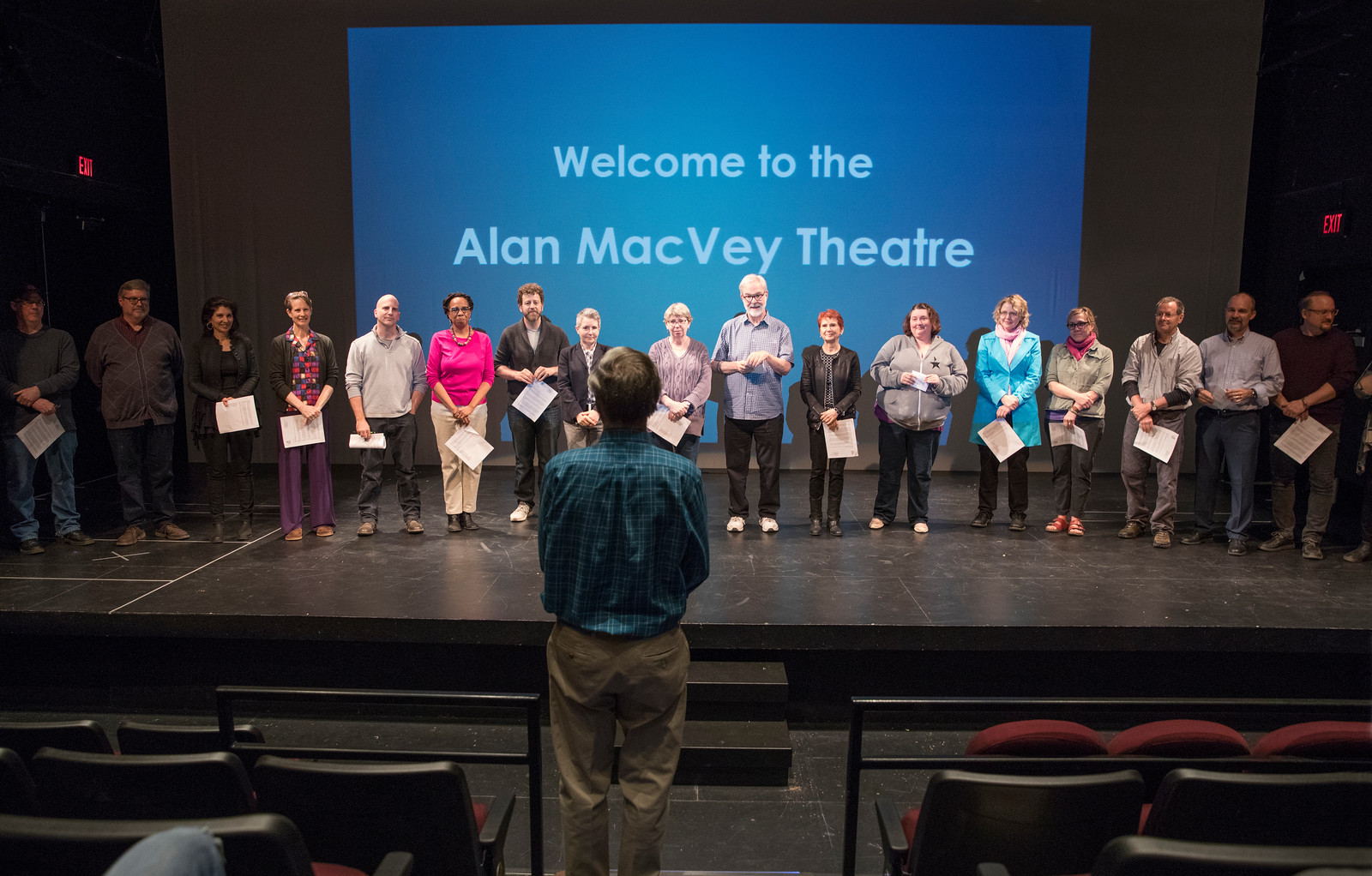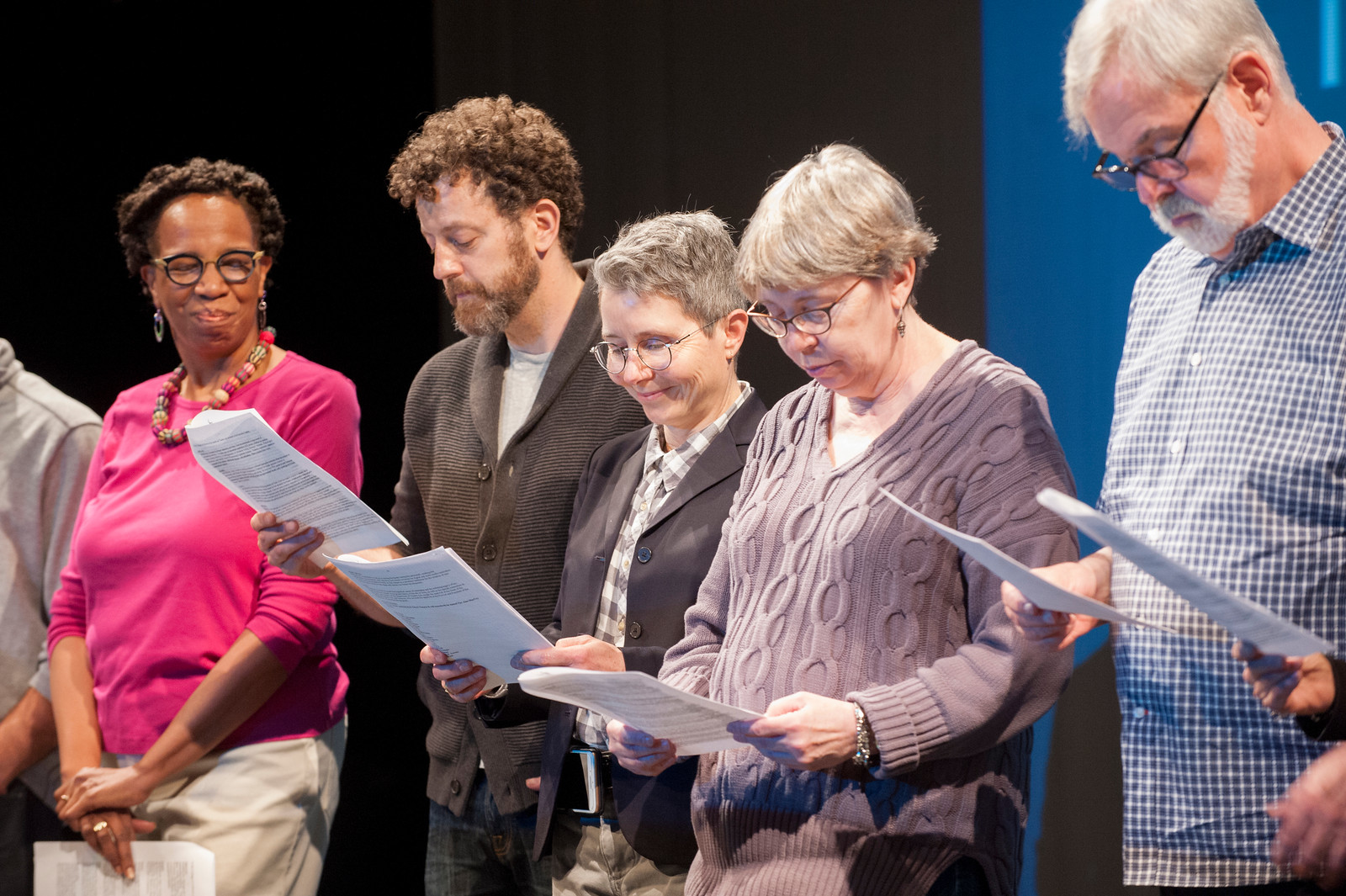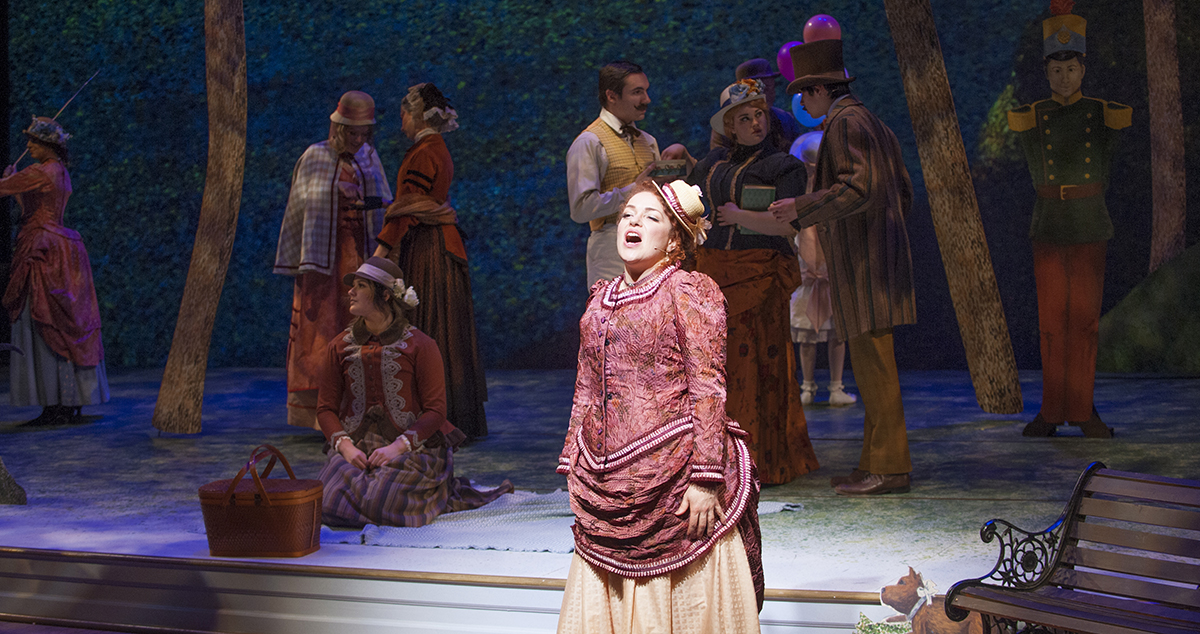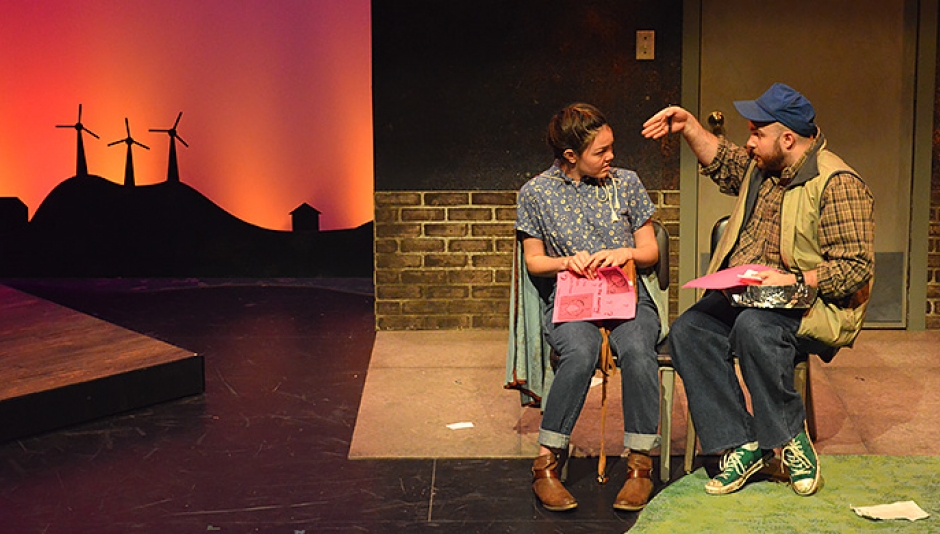.jpg)
Theatre
The University of Iowa Theatre Building’s “Theatre B” has seen a lot of new. New plays. New generations of students. New ideas.
Now it has a new name to match: The Alan MacVey Theatre.
When Alan MacVey, who has chaired the University of Iowa Department of Theatre Arts since 1991, was called into Theatre B on April 17 to resolve a problem of some sort, he expected the usual. Some sort of tech issue, perhaps, like something with the lights or the sound. Instead, he walked into the surprise of a lifetime—or at least of a career.

Rather than a problem to fix, MacVey was met by his faculty and staff colleagues, who proceeded to read, for an esteemed audience of one, a proclamation declaring the renaming of Theatre B in his honor.
“It was really great,” MacVey said afterward. “These are my colleagues, people I’ve worked with for years, some the entire time I’ve been here. It was a ‘thanks’ from the people who matter most.”
MacVey is stepping down as department chair in 2019, though he will remain on the faculty and as director of the Division of Performing Arts. During his time as chair, MacVey has built upon the work of earlier giants of Iowa theatre—such as E. C. Mabie and David Thayer, whose names grace the other two theatres in the building—to nurture an outstanding academic theatre program with a unique focus on developing and presenting new works. After all, the program includes the renowned Playwrights’ Workshop, one of the pillars of the UI’s reputation for world-class writing.
Read the faculty's proclamation renaming Theatre B the Alan Macvey Theatre
The bulk of that new work is birthed in the newly named Alan MacVey Theatre, which serves as a lab for experimentation.
“I think I’ve spent more time in that theatre than practically anyone,” said MacVey, “with some 30 plays a year, and all the rehearsals and performances.”

Not only has he overseen much of the creative work that gives the space its soul, he also has tended to the bricks and mortar, with new staging, lights, floors, and other updates being installed in 2018.
Truly, the Alan MacVey Theatre has been a creative and academic home to its namesake. So how does it feel to join Mabie and Thayer in having spaces named for them?
“For me to be in that company is extraordinary,” he said, noting that the Theatre Arts program will be celebrating its 100th anniversary in 2021.
POINTS OF PRIDE
MacVey’s tenure as chair has included many ups—such as the hundreds of new works presented, many of which have gone on to be produced nationally—as well as downs, such as the catastrophic 2008 flood that severely damaged the Theatre Building. Celebrated playwrights such as Kirsten Greenidge, David Adjmi, and Sherry Kramer have graduated and developed their careers.
Amid it all, three points of pride stand out for MacVey, who for 40 summers also served on the faculty at Bread Loaf School of English at Middlebury College in Vermont.

directed by Alan MacVey
One of them is initiating the Big Ten Theatre Consortium, which commissions plays by outstanding American female playwrights. The purpose of the initiative is to promote the writing and production of new works about women, with excellent roles for young women, by professional and academic theatres around the country, and to draw attention to the need to produce and support such plays. Each year the theatre departments and schools of the Big Ten have the first opportunity to present the newly commissioned play, and then the play is available for production anywhere. The consortium has resulted in works such as Good Kids (2014) by Naomi Iizuka and Twilight Bowl (2017) by Rebecca Gilman.
A second initiative with far-reaching impact is the Partnership in the Arts program, which brings renowned artists to campus to work with students and faculty in the production of new work. Those new works are presented during the UI theatre season as works in progress, with the hope that the visiting artists will continue to develop and present them elsewhere after they leave. The program, which has been ongoing since 1992, has resulted in works such as Marathon Dancing (1992) by Ann Bogart, The Seven (2004) by Will Power, In the Night (2010) by Martha Clarke, and Rome Sweet Rome (2016) by the Q Brothers Collective.

K. T. Peterson (directed by Lila Rachel Becker),
presented in the Alan MacVey Theatre
A third innovation catalyzed by MacVey, one that has helped shape all of the arts at the University of Iowa, is the Public Digital Arts program. Through the initiative, a “cluster” of new faculty has been hired for Art and Art History, Cinema, Computer Science, Dance, Mechanical and Industrial Engineering, Music, and Theatre Arts. The new faculty are augmented by a strong cadre of existing faculty, and they all focus on exploring the use of emerging technologies and artistic practices to create new approaches to artistic production and performance. The cluster program has a mission of “using art to strengthen the human component in science and technology, and using science and technology to enrich works of art.” In addition to the faculty members’ individual, cross-disciplinary work, the program administers the Certificate Program in Public Digital Arts, open to all UI students.
Joe Kearney, the interim dean of the College of Liberal Arts and Sciences, noted that MacVey’s impact has had a far reach during his still-flourishing career.
“Renaming the theatre for Alan is such wonderful recognition,” Kearney said. “He has had tremendous influence and has helped advance the arts at Iowa and nationally in many different ways. He has a national profile as a director and has helped build a strong creative community. We are lucky to have him, and I can’t wait to see a new play in the Alan MacVey Theatre.”
As MacVey steps down from serving as chair, he will have more time for teaching and mentoring students. The road ahead is wide open for him, but one thing is certain: He will be engaged in bringing new creative work into the light in his namesake theatre.
—by Nic Arp